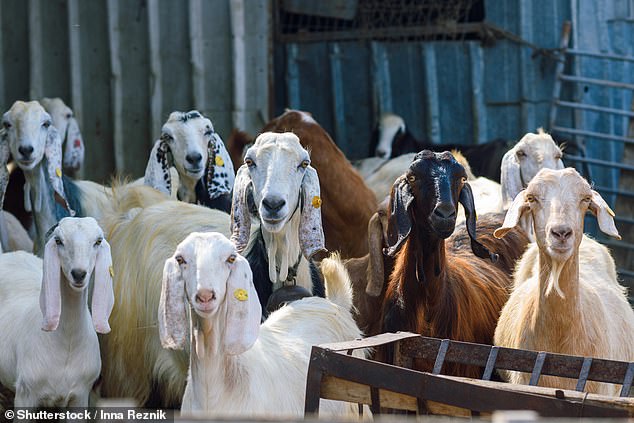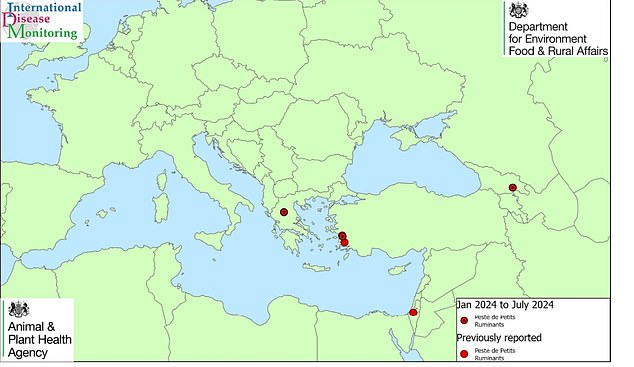Could the virus behind a devastating ‘goat plague’ in Greece infect feta cheese supplies and spread to humans?
There are concerns about a fast-spreading outbreak of the deadly infection, with around 14,000 affected animals already culled in the holiday hotspot.
Goat plague, technically called peste des petits ruminants (PPR), can kill between one-third and 100 percent of the herds it infects, with symptoms beginning about three weeks after initial infection.
It is known to spread through infected tears, mucus and small droplets when animals cough.
The outbreak, the second of its kind recorded in the EU, has prompted Greek farmers to calm fears about how the supply of feta cheese could be affected.
Greek farmers have denied that production of the country’s famous feta cheese is affected by the outbreak.
But what do scientists and officials say about the potential impact on human health?
Greek farmers battling the outbreak have denied that feta cheese production is affected by the outbreak.
Christos Tsopanos, a senior figure in the Greek Livestock Association (SEK), has insisted that the pest “will not jeopardise feta exports” and producers plan to produce 120,000 tonnes of the cheese this year.
“Our country has 14 million goats and sheep, more than any other (EU) state,” he said. guardian reported.
“We have enough milk. The authorities have acted quickly to deal with this situation.”
Experts told MailOnline that PPR is a virus similar to the one that causes measles in humans.

Goat plague, technically called peste des petits ruminants (PPR), can kill between one-third and 100 percent of the herds it infects, with symptoms beginning about three weeks after initial infection.
However, it is “extremely unlikely” the disease will infect people, says Professor Paul Hunter, an infectious diseases expert at the University of East Anglia.
“The virus has been around for more than a century, mainly in Africa, the Middle East and the Indian subcontinent,” he said. “It probably evolved about 100 years ago in West Africa,” he added.
“Given that the disease has been around for so long and in environments where people and host animals have fairly close contact, I think it is very unlikely that it would pose a risk to humans.”
PPR was first detected in Greece last month, on July 11, in a small herd of more than 250 goats and sheep on a farm in the northern region of Thessaly.
More cases have since been identified, leading to the culling of some 14,000 animals.
Under EU rules, if a case of PPR is detected on a farm, an entire herd must be culled and strict disinfection protocols must then be implemented on the premises.
Greek authorities have suspended all slaughter and transport of goats and sheep during the outbreak, raising fears of a meat shortage in the country if the disease is not brought under control soon.
Dimitris Moskos, vice president of the Greek Livestock Association, said: “Consumers should understand that this disease only affects animals.”
He added that farmers now believe PPR reached Greece from animals imported from Romania, which is suffering its own, more widespread outbreak, with over 200,000 animals culled.
However, Greek government officials have insisted that epidemiological investigations are still ongoing.

This map, from the Department for Environment, Food and Rural Affairs, shows where PPR has been reported across the European region; red dots with a black slash show outbreaks so far this year, while solid red dots show previous incidents.
PPR was first discovered in Côte d’Ivoire, on the west coast of Africa, in 1942, and cases and outbreaks have since been reported around the world.
Symptoms in goats and sheep include fever, discharge from the eyes and nose that may make vision and breathing difficult, bad breath and diarrhea.
Almost all animals that show symptoms of PPR will die from the infection.
Although the disease can infect other animals, such as pigs and cattle, it does not cause any symptoms and no cases have ever been reported in people.
The UN Food and Agriculture Organisation estimates that PPR causes £1.6 billion in economic damage to livestock each year.
An assessment of the Greek outbreak by the UK’s Department for Environment, Food and Rural Affairs (DEFRA) said the risk of PPR reaching the UK is currently “negligible”.
They noted that imports of live animals from Greece are currently banned due to a previous ban on the movement of animals after a separate disease, called goatpox, was found in the country in October last year.
However, DEFRA officials noted that cheese and milk were still being imported from Greece, a fraction of which was unpasteurised, meaning it had not been heat-treated to kill potential pathogens.

Greek authorities have suspended all slaughter and transport of goats and sheep during the outbreak, raising fears of a meat shortage in the country if the disease is not brought under control soon.
“Between 1 May and 12 July 2024, 3,818 tonnes of milk and dairy products were imported from Greece,” the assessment reads.
‘Of these, 98.4 percent were pasteurized cheeses and 1.6 percent were unpasteurized.’
But they added that the risk of PPR entering the country via this route was considered due to the time it takes to get such products to British markets.
“It is suggested that PPR has low survival rates in raw meat and milk products, and the ripening time of cheeses and duration of transit to the UK are expected to be likely to be longer than the survival time of the virus in these products,” they said.
However, they acknowledged an overall “lack of evidence” on PPR survival in these products in general.
DEFRA officials concluded: “We will continue to monitor the situation as this is an important exotic disease which will be of concern to the EU in terms of its ability to spread and its impact on livestock.”
The last outbreak of PPR in the EU was recorded in 2018 in Bulgaria. PPR outbreaks have also been reported in 2024 in Turkey and in Greece.


